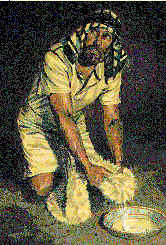A common tactic among Christians who seek God’s guidance and direction is to follow the example of biblical hero, Gideon. (see Judges 6:1-8:32) Many people searching for God’s will, lay out a “proverbial fleece,” and ask that God show them which way to go. They hope for a sign, or at least a strong feeling.
Let’s think about Gideon for a moment. When God called Gideon to lead his people in victory over their oppressors, the man was hiding out in the bottom of a winepress threshing wheat. Remember, to thresh wheat, one needs the wind, and open air, so the chaff can blow away, and leave the kernels behind. (One doesn’t get much of that, in a pit of a winepress.) This man was scared silly. One can’t expect to feel even much of a breeze in a hole! God calls him “mighty warrior” too. HA! What a sense of humor! He was either being totally sarcastic, or meant Gideon could be this with God’s divine intervention–in the future. (or maybe both, I wasn’t there to hear the Angel of God’s actual tonal inflection) ;)
Then, Gideon starts mouthing off, acting all bitter, and asks that the Angel of God to actually prove he is really God. To my knowledge, no one else in the Bible is this brash. Graciously, God permits this, instead of just smiting his sorry butt, he obliges him, and burns up a meal, right in front of Gideon. This, of course, scares the snot out of Gideon, and he believes, sort of. He’s still a big-time coward. God instructs him to take down his family’s idols that they all worship. God’s not a big fan of idols. DUH. God was already putting up with a lot of bologna. This garbage removal is an obvious “first things first” order of business.
Everyone in Israel knows you should not worship idols, EVER (they all are aware of those 10 Commandments, and laws of Moses stuff.) Gideon is totally justified to rip them down immediately; so he marches over and does it, no problem. NOPE. Not at all. Gideon goes the cowardly route, and tears down the family idols, by sneaking out to do it in the middle of the night, with a few buddies.
After gathering troops, still, Gideon struggles to feel right or the least bit courageous about God’s calling, or God’s Almightiness. This unlikely victor asks for, not just one miracle, but 2, yes two, miracles, before he follows God’s direction. Very presumptuous, indeed, not to mention faithless.
Here’s the kicker sometimes left out in this hero’s story. After a mighty, and completely miraculous victory, over a powerful and oppressive enemy, the Midianites (with a tiny fighting force of just 300), Gideon constructs a sacred golden object in his town that is soon worshiped by him, his family, and the whole community. WTHuh? I think Gideon and his ways boarder on ridiculous. He’s quite ordinary, in fact. Just like you or me?
While some use the fleece part of the story as a prescriptive idea for determining God’s will–a genuine way to find God’s guidance and will–I believe the Bible includes it as a failure of faith on Gideon’s part, one of several. Really the entire story is part of a greater witness to an idolatrous and unfaithful era in the times of the Judges. It’s really not a picture of Gideon as a good follower, at all, but instead a picture of God, and his forbearance with a very weak individual, a supremely unlikely leader, and a faithless people he has called his own, and wants to save. God continues to use misfits, and losers in his is amazing Story, but we don’t have to emulate these folks in their weaknesses.
In reality, Gideon was like a lot of godless inhabitants of the region; he was a superstitious sort. This was an unfaithful and tumultuous time in Israel’s past as they co-opted with many ungodly practices. Are behaviors of Gideon’s type really the best for us, or the most advisable? I say, “No.”
So if not, what should we do? I’d love for you to weigh in here on this! But, I’ll put in a few ideas.
First, we shouldn’t think of spirituality/the Divine as magic. “If I do this, I’ll know I should do this thing here, if this such thing happens.” Totally hoodoo. That is trying to get God to jump through hoops, so we feel more comfortable. Yes, sometimes God works with this shortcoming in us, but we should also understand that God will purposefully let us flounder sometimes.
Which way to go, or what to decide, might be part of our growth process. Also, Biblical narratives show that God will purposefully allow us to encounter temptation, or the opportunity to make an unwise choice.
Loyalty, and a close walk with him is one of the best guards against going hoodoo with God. (I call this close walk, Practicing the Presence of God. So did Brother Lawrence.) If we are being loyal/obedient, and we thoroughly love God with all we are, it is much easier to choose what God wants for us. And I really think it’s not always just one specific thing we have to pick that is his “will” for us. Sometimes, it’s the situation of good, better, and best. God doesn’t bite his nails wondering if we’ll pick the right thing, and then viola– “be in his will.” He redeems situations, even the foolishness we get ourselves into. It’s that much better if we pick wisely, and make him the center and glory of our decision making.
Yes, sometimes God will open and close doors, and almost seem to force our hand. If we love and trust him, we’ll be okay with that, knowing that he will do that sort of thing for our best benefit and interest, (though it may be hard to see what that is at the time.) To test God, by fleecing him, is to deny ourselves the opportunity for a close intimacy with God. He is a relational Being. He gives us opportunities to walk with him by faith, and not just by sight.
I would love to hear your responses to this post.
Leave a comment, if you will.



